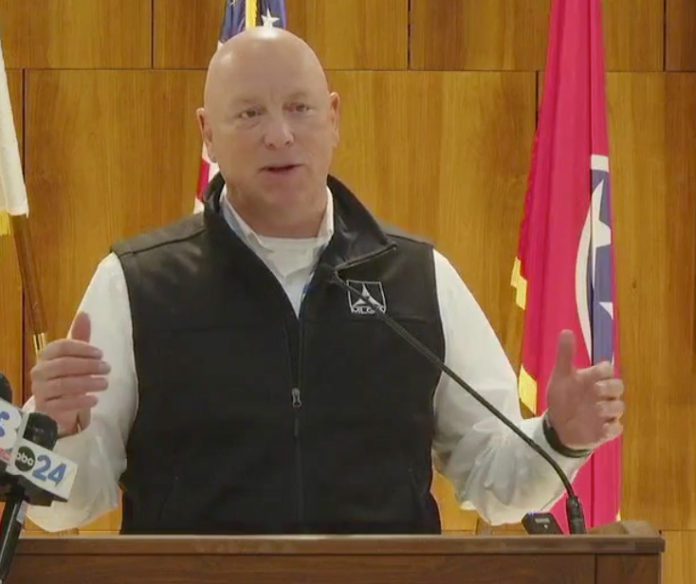After receiving a baptism under fire with the recent bomb cyclone winter storm during the Christmas holiday, newly minted Memphis Light, Gas and Water Division (MLGW) CEO and President Doug McGowen delivered an after-action report to the Memphis City Council Tuesday (Jan. 10).
McGowen, who took the reins of the city owned utility company last month, updated councilmembers about the storm that brought brutally cold temperatures to the Memphis area, freezing water pipes, causing rolling electrical blackouts, and sparking a boil-water advisory caused by burst underground water lines that negatively impacted water pressure.
At the close of questions during the council’s MLGW Committee meeting, members applauded the efforts of McGowen and the shorthanded MLGW workers, who managed and repaired the system through the Christmas holiday.

“It’s just the nature of the utility industry. What was unprecedented, as you talked about, for the temperature to drop to the extent that it did in the time that it did, we haven’t had that. So, I want to commend MLGW for the job that you’re doing,” said council Chair Martavius Jones.
In November, Jones was the only member to vote against McGowen’s approval to the post, citing the lack of a nationwide search, like other job candidates underwent, such as Memphis Police Chief Cerelyn “CJ” Davis.
Prior to taking the job, McGowen served as Memphis COO for Mayor Jim Strickland’s administration.
The weather, power and water situation began a near-catastrophic deterioration on Thursday, Dec. 22 when a winter storm cut a swath of ice, snow and below freezing temperatures across the nation.
Over the space of a few hours, temperatures plunged more than 50 degrees to below freezing.
As a result, the quick demand for home heating outpaced the Tennessee Valley Authority’s, along with other major energy providers like Duke Energy and PG&E, capacity.
By the next morning, the TVA asked for voluntary reductions in power from its clients. It quickly developed into a contractual curtailment of power, including rolling blackouts.
“We actually activated our emergency electrical team, our electrical crisis action team, when the wind became gusty,” McGowen said.
By the next day, the TVA ordered local power companies in its seven-state service area to reduce electrical demand by five percent. On Saturday, Dec. 24, TVA increased it to 10 percent. The rapid escalation in demand left the federally run provider with few outside options to boost output.
“They have contracts to import power inside the TVA footprint. They were not able to execute those contracts because people outside the TVA footprint could not have any power to share. So, this was something that affected the South very deeply, very broadly,” McGowen explained.
Locally, the reductions were spread across Shelby County. Out of hundreds of circuits, only those critical to vital infrastructure, like hospitals, were spared.
“Because of the storm and the rolling blackouts, about 260,000 people had their power off for some period of time, be it 30 minutes, or several hours, or a couple of days,” said McGowen.
By midnight, Christmas Eve, only 30 customers were without power. Among the worst-affected communities were Hickory Hill, North Memphis, and Whitehaven.
Councilmember Jeff Warren, a TVA critic, said, “I think what we’re seeing is the result of climate change. I think it’s interesting how we have a lot of comments from the TVA about how much better their system was…
“As we’re looking to where we’re going to get our power long term, I think the myth of TVA’s invincibility has been shown here and I think we need to remember that as we try to figure out where to go as a system.”
Warren’s comments were in reference to the years-long debate over whether the city should continue its relationship with TVA or seek another provider of electric power.
On Dec. 7, the MLGW board rejected a new 20-year contract with TVA, citing the length of the contract. McGowen’s MLGW predecessor, JT Young, recommended approval of the contract, which would have required City Council approval if board had said yes.
Regarding the water problems, McGowen said, “The rapid drop in temperatures, combined with the wind chills, had a significant impact on water systems in general; those that were run by MLGW, but also those on private property and commercial property.
“They had freezing water pipes, causing ruptures that caused leaks, which dropped our water pressure; that’s how the crisis happened.”
And then there was the thaw out. With the ground warming, 52 water main breaks occurred throughout the county. There were also 54 commercial properties that saw pipes from fire protection systems burst, causing further problems with pressure and property damage.
“Some of the buildings, like warehouses, are currently unoccupied, causing delays in reporting. There’re probably tens of thousands of customers that had some kind of water impact,” said McGowen.
During the week-long ordeal, MLGW workers put in 16-hour shifts and worked throughout the utility to provide technical and other support to meet customer demand.
McGowen told councilmembers that following a winter storm in 2021, millions of dollars of investments were made to the city’s water system, including water pumps, as a part of an overall $1.2 billion investment.
“Because we made investments in our water pumping stations with The Way Forward Plan, it allowed MLGW to double the normal pressure to keep water online for customers,” said McGowen.




